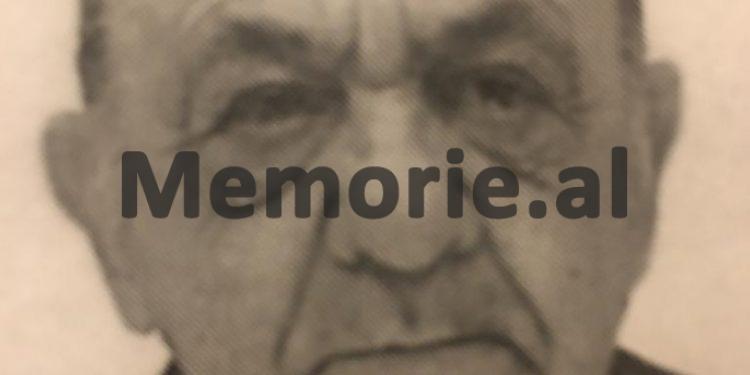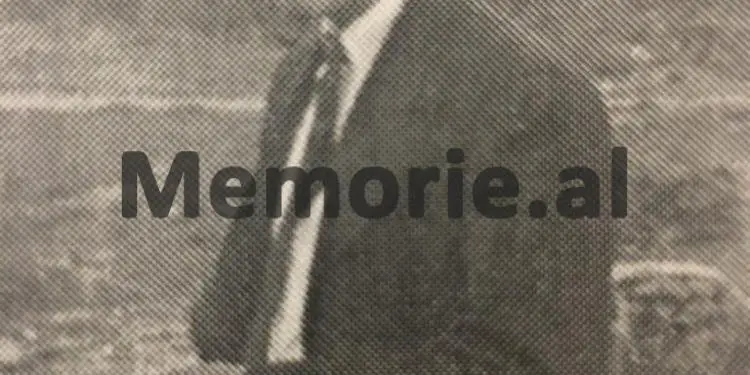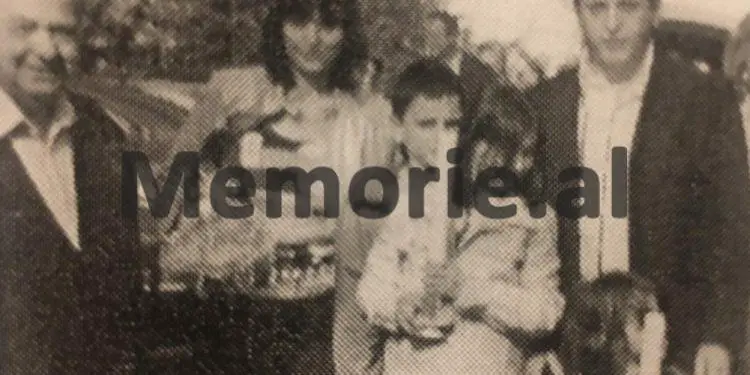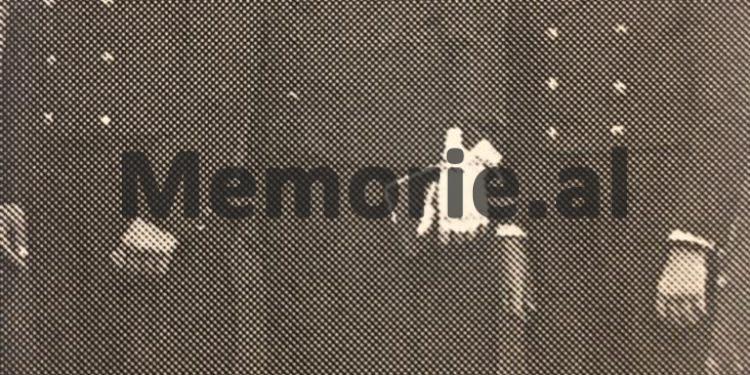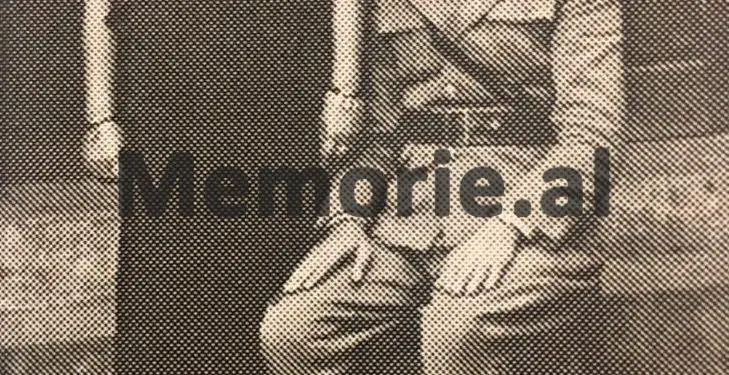Dashnor Kaloçi
Memorie.al publishes the unknown story of Parid Derani originally from the village of Shkjez in the district of Shkodra and living in Gelsenkirchen Erle, Germany, where his father, John and brother, Jaku, during the period of the Zog Monarchy served as a military with the rank of major and in April 1939 they accompanied the King to the border with Greece, while Paris, who during the period of occupation of the country took part with arms in hand with the Zogist detachments of Abaz Kupi, in July 1946 was arrested as a member of the group of the organization “Democratic Union” led by Sami Qeribashi, after together with Abdullah Berberi, Petrit Berisha and Akil Basha, were engaged in throwing tracts drafted by the main leaders of that organization, which called for a boycott of the elections of December 2, 1945. How Paris was arrested two more times in 1955 and 1979, inhuman tortures in the Tirana investigation, where he was asked to admit what he had said about Enver Hoxha and release from prisons where he suffered for 27 years and eight months in the hell of the communist regime.
Arrest at the demonstration where Liri Belishova was injured
After continuing his education in primary and secondary schools in Bari and Rome in Italy, together with his brother Achilles, Parid Derani returned to Albania in 1942 together with many other Albanian students who were then attending classes in Italian schools. After arriving in Tirana, Paris became associated with a group of comrades who had engaged in the anti-fascist movement and who had carried out concrete actions against the Italians. In this regard, Parid Derani says: “When we returned to Tirana in 1942 together with my brother Achilles, we connected with a group of friends who had long since begun their engagement in the Anti-Fascist Movement and among the most active friends of the group. where Achilles and I were, it was Sander Jorgoni, (the son of a great Tirana merchant) who offered us in that group where some other Tirana friends were also part. In September 1942, Sander Jorgoni called Brother Achilles and I, and together we went to Peza where we were on guard during the Conference. During that time, the Keçi brothers and some other young people from Tirana also stood guard with us, because at that time the communists were not separated from the nationalists. Also at that time I took part in the big demonstration that took place against the Italians, where the young communist Liri Belishova was injured and injured her eye. In that demonstration I was arrested and sent to the Tirana prison, where Koçi Xoxe was in charge of the communist cell. There in that prison I slept close to Pal Doçi, whose brother, Marku, had been a soldier in the Zog Monarchy and a close friend of my father, Gjon Derani. From that prison we were released after a few months and when I got out I stayed at home for some time and at the end of 1943, I joined the Legality gangs led by Abaz Kupi, who had his headquarters in the village of Xibër i Matit, while his brother im, Akili, was with Musa Picari’s Zogist gang operating in the Preza area. As part of the legalist squads commanded by Abaz Kupi, I took part in several battles, such as the one in Kruja, against Italian forces a few days after the Mukje Conference, and in November 1944, when fighting for the liberation of the capital. , I had come home to Tirana, as I was seriously ill from a cold. As a result of that illness, I could not leave Albania together with my brother Achilles, who came to take me with him “.
The first sentence with the “Democratic Union”
Although Parid Derani had joined Major Abaz Kupi’s legalist squads during the war, the communists who came to power in late ’44 did not initially harass him. But the vicissitudes of Paris began in 1946, after his involvement in the Democratic Union, an anti-communist group that aimed to create a truly democratic opposition to the ruling Albanian Communist Party. Regarding this, Paris says: “I had joined that organization for months together with Abdullah Berber, Petrit Berisha and Akil Basha, with whom we had distributed tracts that had been drafted by the leaders of that organization on the occasion of the elections of December 2, 1945. How As a result of that activity, I was arrested on July 19, 1946, and together with 17 other comrades, they formed the first group of nationalist youth to emerge from the ranks of the accused by the communist regime. In December of that year, we went to court, where I was sentenced to five years in prison, while Abdulla Berberi, Petrit Berisha and others were sentenced to ten years in prison. I suffered all the sentence given to me by the court and I was released from prison in 1951, after I had left behind the horrors of the Maliqi Swamp, Vloçisht, Jubë-Sukth, etc. “, Parid Derani confesses.
Second sentence in 1955, at 16 years
The five years of imprisonment that Parid Derani suffered until 1951 were the beginning of his long odyssey in communist prisons, because after that another ordeal of suffering would begin, which he recalls: “After I was released from prison First, I worked as a manual and plumber worker in Tirana, but this did not last more than four years, because in 1955, I was arrested again together with some other friends such as: Tush Berisha, Skënder Jeniçeri, Zef Perolli, and any other I do not remember well. The reason for the arrest was because we wanted to escape from Albania by a boat we had found in Cape Rodon. After we pulled the boat from the bottom of the sea that the Yugoslav military had had and got it ready for navigation, we were suddenly arrested by the State Security, as someone inside us had spied. I was sentenced to 16 years in prison, and I was serving my entire sentence, as I was a repeat offender and for us, there was no forgiveness. “After I was released from prison in 1971, I started working again as a manual worker in the companies of Tirana, where I was not separated from the Security people who followed me in every step I took”, says Parid Derani, regarding his second sentence in 1955 when he was arrested after he and some friends had tried to escape from Albania by a boat they had found somewhere on the coast of Cape Rodon.
Third sentence in 1979, 8 years
Even after his release from the second prison, the sufferings and vicissitudes for Paris Deranin were not over, because he was arrested again for the third time in 1979. In this regard he recalls: “After I had worked for eight years in hard work arm, in the enterprises of Tirana, in September 1979, I was arrested again because I was not separated from the shadow of the “enemy of the people”, with which I had been stigmatized by the communists since 1946. My third arrest was one of the horrible ones I had removed because during the investigation I was tortured inhumanely. Apart from the many accusations made against me as agitation and propaganda, an attempt to escape, one of the most serious, was the one where I was asked to admit that I had said that: ‘Enver Hoxha does not breathe air like everyone else, but the blood of his victims ‘. During the investigation, all the machinations were used for me to be severely punished, but in the end, I did not accept anything and was sentenced to only 8 years in prison, which I suffered in Spaç, Bulqiza, and Shënkoll of Lezha. I was released from that prison in 1986, benefiting from a year of amnesty granted by Ramiz Alia to us political prisoners at the time. “Even after my release from prison, I was still the object of persecution and surveillance by the State Security, which had blacklisted me,” concludes his tragic story, Parid Derani, a former member of Abaz Kupi’s Zogist gangs, who suffered 27 years and 8 months in the prisons of the communist regime of Enver Hoxha.
Major Gjon Derani, Zog’s soldier who founded Xhenjon
The early origin of Parid Deran’s family is from the village of Shkjez, and his ancestors came down to the city of Shkodra in the 30s of the XVIII century. That family until the beginning of the First World War, was known by the surname Shkjezi, which was their real surname, and his father, John, changed the surname to Derani. John, was born in 1878 in Shkjez, and was one of the only men of that family left alive, because the others had been killed by the enmity, they had had with the Sykaj tribe. At the beginning of the last century, Gjon Derani was educated at the Saverian College of Shkodra around 1915-‘16 and then he went to Austria, where he attended a military school in Graz, in the branch of Xhenjo. After finishing school, Gjoni returned to Albania and during the First World War, he served as a translator in the Austro-Hungarian army in Shkodra. At the end of the war, Gjoni left Albania for Germany, where he studied for another two years in the field of military engineering for the construction of roads and bridges. After graduation he returned to Albania and joined the National Army with the rank of lieutenant. In 1920 during the Congress of Lushnja, Gjoni was one of the four battalion commanders who were assigned to accompany the members of the Congress to Tirana. From 1920 to 1924, Gjoni served in Xhenjo’s weapon in Tirana, where he was one of the founders of that weapon, where he personally dealt with the construction of buildings that are still located today on the east side of the capital. In the June Movement of 1924, Gjon Derani sided with the fanatical forces because he had a close friend Luigj Gurakuqi, with whom they had houses next door in Shkodra. When Ahmet Zogu returned to power in December 1924, he called John to the Palace and said, “I am glad that you stayed here and did not leave like many other soldiers because Albania needs many brave and smart officers. After that meeting, Zogu issued the decree and appointed Gjoni again in Xhenjo’s weapon in Tirana. In 1921, Gjoni married Gjystina Berisha, whose family had come from Skopje to Shkodra after the Serb massacres, and from that marriage they had two sons, Achilles (in 1922) and Paris (in 1925). Until 1935, Achilles continued his education at the Lyceum of Korça and that year, together with Paris, he went to attend school in Italy. The reason for sending them to Italy was King Zog who suggested it to Major John Deran, as Achilles and Paris had broken the water pipes that supplied the Royal Palace. The two Derani brothers, after attending classes in Bari for some time, went and continued them to Rome, where their father had bought them an apartment. They returned to Albania in 1942 together with many Albanian students who were attending schools in Italy at the time. From 1924 until 1939, Gjoni served in Xhenjo’s weapon and lived with his family in Tirana in a villa that is still located near the Embassy block. On April 7, 1939, Gjon Derani escorted King Zog to the border with Greece and then returned to Tirana. After some time, he joined the “Dajti” Battalion and left it during the Italo-Greek War. He and his wife then left Albania for Italy, where they had both their children who were then attending school, but again Gjoni, returned to his homeland and during the fighting for the liberation of Tirana, he was arrested by the partisans and was held for several days in the investigator. But then he was released because there were enough statements in his favor. During Enver Hoxha’s communist regime, two villas were seized from him and he worked as a laborer until he died in misery in 1975, in a barracks near the Linza quarry. While his son Achilles who had remained in Italy, emigrated to Egypt and then to Lebanon, where he engaged in the wars in the Middle East in the Albanian battalion formed by King Zog. Achilles later emigrated to Canada and the United States, where he died in Las Vegas in 1998. John also had a sister, Lisa, and three other brothers, Jacob, Luke, and Lazarus. The first of the Jaku brothers, who during the period of the Monarchy had served as a military with the rank of major in the weapon of the Border Guard, died in an Italian hospital in 1955. While the second brother served as a parish priest in the villages of Shkodra, and the brother third, he worked as a shoemaker in the city of Shkodra where he passed away in 1980. /Memorie.al




